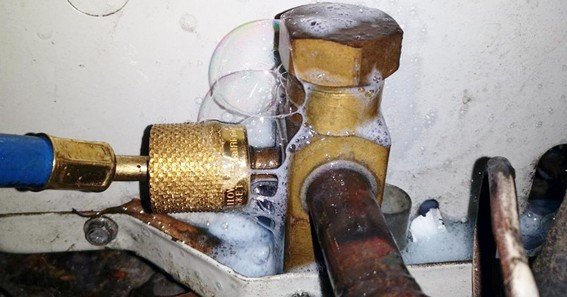If you’re concerned about an ac refrigerant leak, you’re not alone. Refrigerant is crucial for your air conditioner to cool the air effectively. When a leak occurs, it can reduce system performance, increase energy costs, and even lead to permanent damage if left unaddressed. In this comprehensive guide, we’ll discuss how to spot a leak, what might cause it, and the steps you can take to fix and prevent future leaks.
1. What Is a Refrigerant Leak?
An air conditioner cools your home by circulating a refrigerant through a closed-loop system of coils, compressors, and lines. In a perfect scenario, this refrigerant never needs replenishing because it operates in a sealed environment. However, when holes or cracks appear in the coils or refrigerant lines, you get a leak. This can happen suddenly or develop gradually over time.
AC Refrigerant Leak: Common Causes
Understanding why leaks occur can help you stay proactive in maintaining your AC unit:
-
Corrosion: Over time, formic acid or formaldehyde can form on the copper tubing, leading to pitted corrosion and eventual leaks.
-
Metal Fatigue: Constant temperature changes cause metal parts to expand and contract, sometimes causing cracks or weak spots in the coils.
-
Physical Damage: Accidental impacts during maintenance, home renovations, or general mishandling can puncture the AC’s copper or aluminum components.
-
Faulty Installation: Improper installation, such as over-tightening or using incompatible parts, can put stress on the system’s joints and connections.
-
Poor Maintenance: Neglecting regular tune-ups may allow small problems (like minor cracks or loose connections) to escalate into full-blown leaks.
2. Warning Signs of a Refrigerant Leak
-
Reduced Cooling Power: If the AC struggles to reach the set temperature or blows warm air, low refrigerant could be the culprit.
-
Hissing or Bubbling Sounds: Air escaping from a tiny hole in the coils may produce a hissing noise, while a more significant leak with moisture might create a bubbling sound.
-
Longer Cooling Cycles: Refrigerant leaks force the system to run longer to achieve the desired temperature, increasing energy usage.
-
Ice Buildup on Coils: Insufficient refrigerant leads to a drop in temperature around the evaporator coils, causing them to freeze.
-
High Utility Bills: Because the unit works harder with less refrigerant, energy consumption typically increases.
3. Possible Consequences of Ignoring a Leak
-
Decreased Efficiency: An AC with leaking refrigerant works harder, raising utility bills.
-
System Damage: Overworking the unit can damage the compressor, one of the most expensive parts to replace.
-
Environmental Harm: Depending on the type of refrigerant, leaks can negatively impact the ozone layer or contribute to greenhouse gas emissions.
-
Health Concerns: Extremely low refrigerant can lead to poor indoor air quality if the system fails to remove humidity effectively.
4. How to Fix and Prevent an AC Refrigerant Leak
-
Professional Inspection:
If you suspect a leak, contact a licensed HVAC technician. They’ll use special equipment (like UV dye or electronic detectors) to locate the exact source. -
Repair or Replace Components:
Depending on severity, the technician may seal the leak or recommend replacing a damaged coil or refrigerant line. -
Recharge Refrigerant:
Once the leak is fixed, the technician will recharge the system with the appropriate refrigerant level. Make sure your AC uses EPA-approved refrigerants to minimize environmental impact. -
Routine Maintenance:
Schedule annual or biannual tune-ups. A thorough inspection can catch minor leaks, corrosion, or loose connections before they escalate. -
Upgrade if Needed:
If your system is old or experiencing frequent leaks, you may want to consider upgrading to a more efficient and eco-friendly model.
5. Best Practices for System Longevity
-
Change Air Filters: Dirty filters restrict airflow, increasing stress on the system. Replacing filters monthly or as recommended helps maintain efficiency.
-
Clear Debris: Keep the outdoor unit free from leaves, dirt, or clutter for better airflow.
-
Check for Odd Noises: Listen for changes in operation sounds. Early detection can save you money in repair costs.
-
Monitor Energy Bills: Spikes in energy usage might indicate hidden issues, including refrigerant leaks.
Frequently Asked Questions
-
How do I know if my AC has a refrigerant leak or just needs maintenance?
Common signs include weakened cooling power, hissing sounds, and ice on the coils. If in doubt, call a professional HVAC technician for a thorough diagnosis. -
Can I fix a refrigerant leak myself?
Generally, no. Refrigerant handling requires specialized tools and certifications due to environmental regulations. Always consult a licensed technician. -
What happens if I continue running my AC with a leak?
Running an AC with a leak forces it to work harder, risking compressor damage and higher energy bills. It can also reduce the system’s overall lifespan. -
Is refrigerant replacement expensive?
Costs vary by refrigerant type and system size. Older units using phased-out refrigerants like R-22 are generally pricier to refill due to limited supply. -
How often should I schedule AC maintenance to prevent leaks?
Experts recommend at least once a year, though biannual inspections can further reduce the likelihood of unexpected leaks and other issues.










